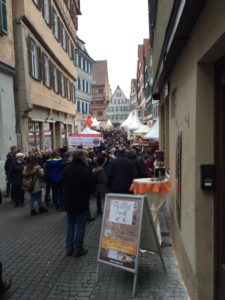
USAG Stuttgart Public Affairs
Shopping in in Germany can be a very positive experience and shoppers will find most of the same things that they’re used to back in the States. Upon arrival in Stuttgart, shopping is one of the first things many newcomers like to do. However, Stuttgart military community members should be aware of some important differences
Malls
One thing most Americans have to adjust to a little in Germany is the way in which Germans shop. Most shops are smaller and in general, most towns have a central, downtown shopping district where most of the specialty stores are located. Larger department stores are gaining popularity in Germany, and at least one or two can be found in most sizeable German cities.
Sprawling shopping malls with dozens of shops, a food court and a movie theater like the kind that dot towns across America are still somewhat rare in Germany, though they can be found in larger cities. There are several large shopping centers throughout the Stuttgart area, including as close as Sindelfingen and Boeblingen.

Photo by John Reese, USAG Stuttgart Public Affairs
Most German cities have a Fussgänger (pedestrian zone) offering a shopping experience that more than makes up for the lack of malls. Think of them as large, open-air, cobble-stoned, mile-long shopping malls. Specialty stores, restaurants and other services line these pedestrian streets, offering just about anything the average shopaholic might desire.
Groceries
Recently, grocery shopping in Germany has become a much more convenient experience. Franchise grocery stores that offer a full range of basic everyday grocery needs can be found in towns (small villages may not have these stores, but they’re usually found in a neighboring village or town).
Grocery stores in Germany are laid out similar to U.S. stores, and though the product names and some of the packaging may be different, the basics are still the same. There is fresh produce, canned goods, frozen foods, frozen pizzas and breakfast cereals.
The measurements used in Germany use the metric system. The information on this page will help with some of the most common conversions.
Also, most German grocery stores do not provide free bags. Most have plastic bags available for purchase for around 10 euro cents each. A very common practice among Germans is to bring their own bags.
Clothes
Just like the weights and measurements for groceries are metric, clothing sizes in Germany are different to those in the U.S. It helps to know some of the different clothing size systems. There are applications for smartphones that can help with size conversion as well as online resources, though the size conversions can vary significantly from brand to brand and even within the same brand. While some clothing now comes with tags that list both U.S. and European sizes, it’s important to be aware of the differences. Most clothing stores offer changing rooms just like in the U.S., so the best practice is to always try clothing on before purchasing it.
 Cash and carry!
Cash and carry!
Cash is still much more widely used in Germany than in the U.S. and many stores do not take credit/bank cards, and sometimes those that do require a minimum purchase. It is not unusual for a German to go to the store with several thousand euros in cash to buy a full kitchen.
Many larger stores and other shopping venues are now accepting credit cards. However, smaller stores, and especially grocery stores, often don’t. A good rule of thumb if you are buying food, or shopping in a store where most of the purchases would be below €100 is to be prepared to pay with cash. For stores where the average purchase is much higher, ask if they take credit cards.
The Girocard, a German equivalent to an American debit card, is gaining popularity. Most American credit and debit cards are not compatible with this system, which is used at grocers such as Penny, Aldi and Lidl. Service Credit Union’s overseas branches offer a Girocard for your SCU account. The cards are available to members at any SCU branch in Germany.
Returns
Return policies are another area in which shopping has changed in recent years in Germany, but they are still a little different than in the U.S. Most large department stores will have return policies, but these policies may be more restrictive than those that Americans are familiar with.
It is important to ask about the store’s return policy before making large purchases and to always keep the receipts. German retailers that do accept returns almost never accept them without a receipt.
